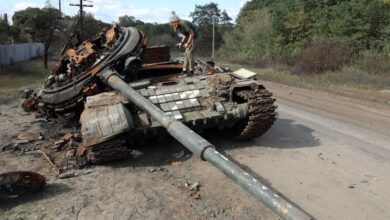Are Ukrainian Weapons Fueling State Repression in Myanmar?
KYIV, UKRAINE – After Myanmar’s armed forces seized control of the country in February, the Southeast Asian nation was thrown into chaos. At least 1,000 civilians were killed in demonstrations, and thousands of others fled to neighboring India and Thailand.
Ukraine has been outspoken in condemning the violence. During a UN meeting on Myanmar, Ukrainian Permanent Representative Sergiy Kyslytsya called on the Tatmadaw (Myanmar’s armed forces) to “stop the repression immediately, including the use of lethal force, intimidation, and harassment against peaceful demonstrators.” In June, Kyiv voted in favor of a UN resolution to stop the flow of arms to Myanmar.
However, Ukrainian BTR-3 armored personnel carriers were spotted on the streets of Yangon amid the riots that followed the coup, drawing activists’ attention to the lesser-known but well-established ties between Ukraine’s and Myanmar’s defense industries.
Internet connections in Myanmar have been cut off again since around 1am Monday amid fears of a crackdown on recent protests. The move comes as armored personnel carriers and other military vehicles have been seen in various locations around Yangon.
#WhatsHappeningInMyanmar pic.twitter.com/mVwC5uWe8M
— Myanmar Now (@Myanmar_Now_Eng) February 14, 2021
Ukrainian Equipment in Myanmar
Since 2004, a thousand Ukrainian BTR-3 combat vehicles have reportedly been delivered to Myanmar. When asked about the matter by Radio Svoboda in February, Ukrainian Foreign Ministry spokesman Oleh Nikolenko declared that his government couldn’t be held responsible “for the use of military equipment purchased by another country more than 15 years ago.”
A misleading statement, according to Yadanar Maung, a representative of the NGO Justice For Myanmar. Early in September, the NGO reported that Ukrainian state-owned companies had been shipping aircraft, ship, and tank parts to the country despite the February takeover by the military junta.
While most of the military-technical agreements had been signed under previous governments, activist Maung claims that arms exports and technology transfers have continued — despite the military’s overthrow of the ruling party.
“Continuing to equip the Myanmar military shows a blatant disregard for the lives of the people of Myanmar,” Maung declared to The Defense Post.
Notably, state-owned arms manufacturer Ukroboronservice is claimed to have shipped over 164 kilos of aircraft parts to the Southeast Asian country in May. Meanwhile, Ukrainian engineering company Motor Sich has allegedly exported engines and engine parts to Myanmar on two occasions since the military coup.

Motor Sich’s most recent shipment, including turbojet engine parts, is supposed to have taken place in late May 2021, well after the military takeover.
At the time, Reuters reported that the Myanmar Air Force had been carrying out airstrikes against “anti-junta militias” in the country’s east, displacing thousands. The company did not reply to a request for comments from The Defense Post.
Joint Ventures
In addition to the recent shipments, several joint ventures between Ukrainian state-owned companies and Myanmar’s defense industry reportedly continue, despite the coup.
Chief among them is a joint project between Myanmar’s Directorate of Defence industry and Ukrainian arms conglomerates Ukroboronprom and Ukrspetsexport. The venture involves creating an industrial plant able to manufacture BTR-4 armored personnel carriers, MMT-40 light tanks, and 2SIU self-propelled Howitzers, as well as repair parts.
In October 2020, Ukrspetsexport claimed in a Facebook post that it had signed a contract with the ministry of defense of an unspecified “Southeast Asian country,” now believed to be Myanmar.
According to the post, the deal involved the creation of an industrial plant able to produce a “wide range of spare parts for light armored vehicles” to supply “such spare parts to other military units” and to “perform work on the modernization of light armored vehicles.”
A project very similar to the one described in the post was listed by the 2019 UN Independent International fact-finding mission on Myanmar as a recommended target for arms export sanctions.
At the time, the fact-finding mission reported that Ukraine was “supporting the Tatmadaw’s military infrastructure and production capabilities.” It concluded that Kyiv failed to refrain from transferring weapons to Myanmar, although they “expected or ought to have expected” that those weapons would be used in acts violating international human rights law.
Whether the industrial complex construction is complete has neither been confirmed nor denied. When reached for comment by The Defense Post, Ukroboronprom representative Julia Marko stated that the conglomerate’s economic activities are “protected by commercial confidentiality” and as such couldn’t be disclosed without the consent of unnamed “third parties.”
“All enterprises of the State Concern operate within the framework of current legislation and international obligations of Ukraine,” she assured.
This answer skirts the fact that there is currently no formal embargo on selling weapons to Myanmar. According to activist Maung, whether or not to export weapons to Myanmar is not a legal but a moral question. “Ukraine should not have transferred arms to Myanmar, knowing that the military there is committing gross violations of human rights, including the crime of genocide,” he argued.
‘Embattled Democracy’
In June 2021, the UN General Assembly adopted a non-binding resolution calling for an arms embargo against the Southeast Asian nation. Ukraine was among the 119 countries to support the motion.
On a number of occasions, Ukrainian president Volodymyr Zelensky has described Ukraine as an embattled democracy fighting off Russian authoritarianism, going so far as to declare that his country was “the security wall of this philosophy of existence, of European civilization, human rights, and freedoms.”
Zelensky’s sentiment was echoed at the UN meeting on Myanmar by representative Kyslytsya: “Ukraine knows how painful it is when a choice of people is stolen by a corrupt regime, hence we stay strong with the democratic forces of Myanmar, its people who are entitled to live according to their choice under the leadership they elect.”
In light of Ukraine being accused of supplying one of the world’s most repressive regimes with the means to silence those very same “democratic forces,” those words now seem to ring hollow.












